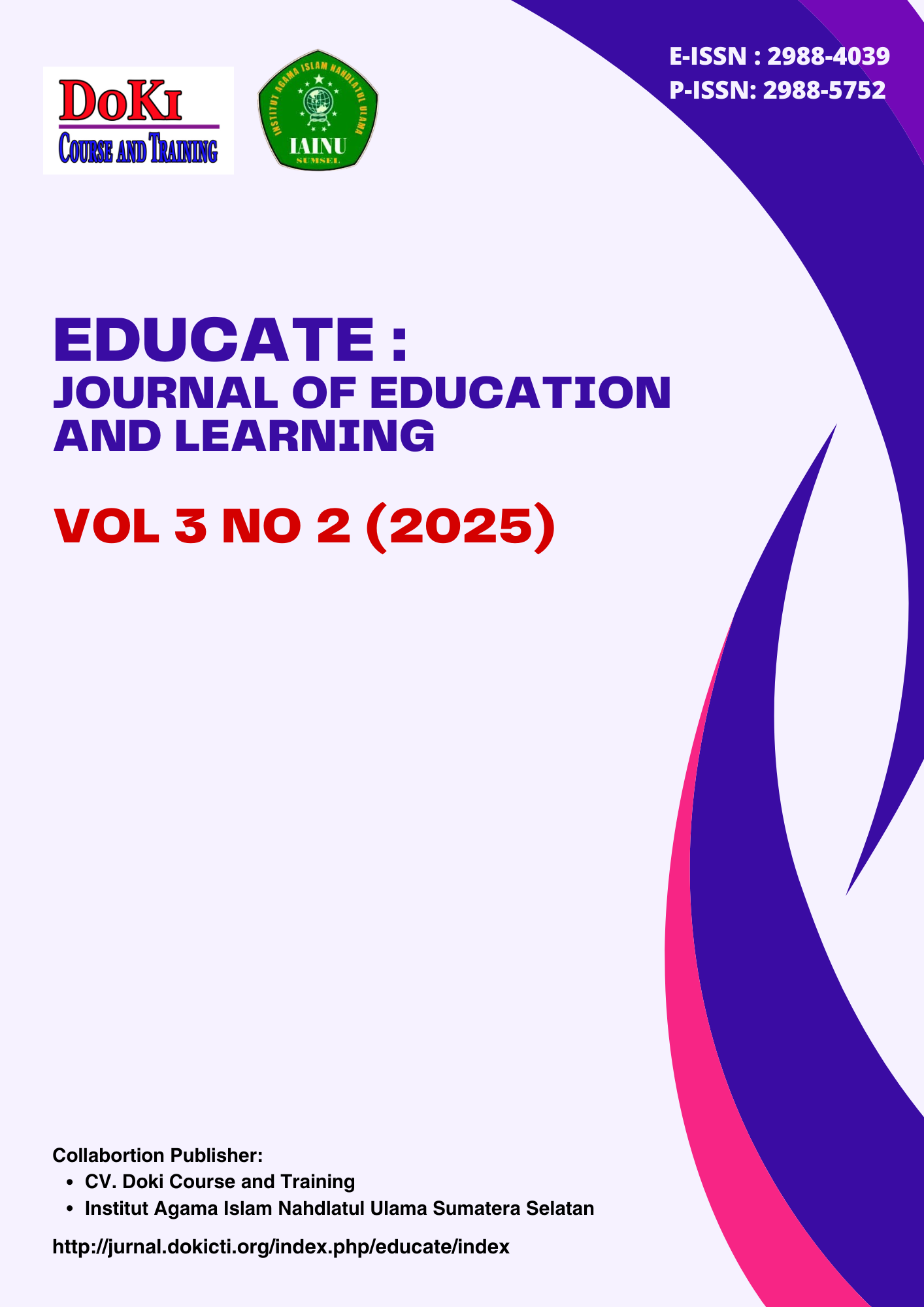Learning Theories In Family Learning Environments
DOI:
https://doi.org/10.61994/educate.v3i2.1142Keywords:
Theory , Education , Learning , FamilyAbstract
Research aims to empower parents to create a strong learning environment right in their own homes. By understanding how we learn, educators and parents can develop effective teaching strategies and boost the overall quality of education. In a nutshell, learning theories are crucial for understanding how children process information and how parents can make learning more effective. Parents can utilize various strategies and techniques, drawing from both general learning theories and specific family learning theories, to improve the quality of their children's learning and academic outcomes within the family setting. This study used a qualitative approach, focusing on school-aged children. It delved into real-life events and phenomena using a descriptive qualitative method, primarily through a literature review of theories in learning and family education. The findings show that learning is a relatively permanent change in behavior or potential behavior, stemming from reinforced experience or practice. Essentially, if someone has truly learned something, they'll be able to demonstrate a change in their behavior
References
Abdullah, M. I. (2003). Family Education for Children. Cirebon: Lektur.
Abidin, A. M. (2022). Application of Behaviorist Learning Theory in Learning (Child Study). Jurnal An Nisa', Vol. 15, No. 1, June 2022.
Derajat, Z. (1995). Islamic Education in Family and School. Jakarta: CV. Ruhama.
Dewantara, K. H. (1961). Educational Science. Yogyakarta: Taman Siswa.
Jailani, M. S. (2021). FAMILY EDUCATION THEORY AND PARENTS' RESPONSIBILITY IN EARLY CHILDHOOD EDUCATION. Faculty of Tarbiyah & Teacher Training IAIN STS Jambi, 90-102.
Jalal, F., & Moeloek, F. A. (2006). ISN Kayu Tanam Seminar Materials.
Lubis, P., Hasibuan, M. B., & Gusmaneli, G. (2023). Learning Theories in Instruction. Intelletika: Jurnal Ilmiah Mahasiswa, Vol. 2, No. 3, May 2024, 01-18.
Majid, M. F., & Suyadi. (2020). Application of Behaviorist Learning Theory in Islamic Religious Education Learning. Jurnal Ilmiah Bimbingan dan Konseling, Vol. 1, No. 3.
Nahar, N. I. (2016). 'Application of Behaviorist Learning Theory in the Learning Process'. Jurnal Ilmu Pengetahuan Sosial, 1 (2016).
Nasution, S. (2019). Family Environment Education. TAZKIYA, Vol. 8, No. 1, January-June 2019, 115-124.
Nugroho, P. (2015). Cognitivist Views and Their Application in Islamic Religious Education Learning for Early Childhood. Jurnal Inovasi Pendidikan Islam Anak Usia Dini, Vol. 3, No. 2, July-December.
Nurhadi. (2020). Cognitivism Theory and Its Application. Jurnal Edukasi dan Sains, Volume 2, Number 1, June 2020, 77-95.
Nurhayani, & Salistina, D. (2022). Learning and Instruction Theories. Yogyakarta: Gerbang Media.
Oktariska, B., Toenlioe, A. J., & Susilaningsih. (2018). Case Study on the Application of Behaviorist Learning Theory in Fostering Students' Environmental Awareness at SMKN 6 Malang. Jurnal JKTP, 1.2 (2018), 159-160.
Patmodewo, S. (2003). Preschool Education. Jakarta: Rineka Cipta.
Soemarjan, S. (1962). Sociology: An Introduction. Yogyakarta: Gajah Mada Press.
Suyati, E. S., & Rozikin, A. Z. (2021). Learning and Instruction. Bandung: Widina Bhakti Persada.
Tirtarahardja. (2005). Introduction to Education. Jakarta: Rineka Cipta.
Uno, H. (2006). Motivation Theory and Its Measurement. Jakarta: PT Bumi Aksara.
Wahab, G., & Rosnawati. (2021). Learning and Instruction Theories. Indramayu, West Java: Adab.
Downloads
Published
Issue
Section
Categories
License
Copyright (c) 2025 Haryanto, Henni Ambarsari, Lidwina Elly Marcyanne Kumala

This work is licensed under a Creative Commons Attribution-ShareAlike 4.0 International License.










